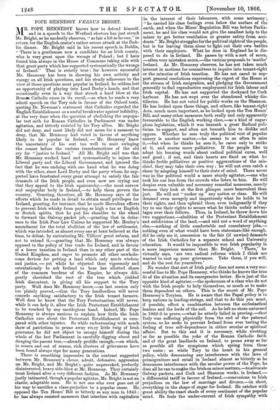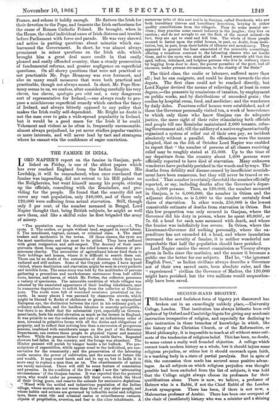POPE HENNESSY VERSUS BRIGHT.
MR. POPE HENNESSY knows how to defend himself, and in a speech to the Wexford electors has just struck Mr. Bright, as he modestly observes, "as fair a hit as he can," in return for the English orator's rather severe attack at the Dub- lin dinner. Mr. Bright said in his recent speech in Dublin,
"There is a gentleman now a candidate for an Irish county, who is very great upon the wrongs of Poland ; but I have found him always in the House of Commons taking side with that great party which has supported systematically the wrongs of Ireland." That is strictly true ; for however successful Mr. Hennessy has been in showing his own activity and energy on all Irish questions, and his steady adherence to the view of those questions most popular in Ireland, he seldom lost an opportunity of playing into Lord Derby's hands, and that occasionally even in a way that struck a hard blow at the Roman Catholic cause in its recoil,—as when he made a very adroit speech on the Tory side in favour of the Oxford tests, quoting Dr. Newman's statement that Catholics regarded the English Establishment as a useful breakwater against infidelity, at the very time when the question of abolishing the unpopu-
lar test oath for Roman Catholics in Parliament was under agitation, and bitterly resisted by his Tory allies. Mr. Bright did not deny, and most likely did not mean for a moment to deny, that Mr. Hennessy had voted in favour of anything likely to be popular in Ireland, — Mr. Hennessy knew the uncertainty of his seat too well to omit swinging the censer before the various transformations of the old cry for "justice to Ireland." All Mr. Bright said was that Mr. Hennessy worked hard and systematically to injure the Liberal party and the Liberal Government, and ignored the fact that he was undoing with one hand what he was doing with the other, since Lord Derby and the party whom he sup- ported have frustrated every great attempt to satisfy the fair demands of the Irish people, and even now are crying out that they appeal to the Irish squirearchy,—the most narrow and unpopular body in Ireland,—to help them govern the country. Granting, therefore, all Mr. Hennessy says of the efforts which he made in detail to obtain small privileges for Ireland, granting, for instance, that he made Herculean efforts to prevent Irish whisky from paying as high a tax as English or Scotch spirits, that he put his shoulder to the wheel to forward the Galway packet job,—granting that in defer- ence to the Irish Poor Law Unions he supported Mr. Henley's amendment for the total abolition of the law of settlement, which was intended, as almost every one at least believed at the time, to defeat, by caricaturing Mr. Villiers' great reform, and not to extend it,—granting that Mr. Hennessy was always opposed to the policy of free trade for Ireland, and in favour of a lower taxation in Ireland than in any other part of the United Kingdom, and eager to promote all other unwhole- some devices for petting a land which only needs wisdom and justice, — yet while he objected thus vigorously and ostentatiously to ask Ireland to bear her allotted share of the common burdens of the Empire, he always dili- gently cherished the root of the tree which yielded Irish discontent, in giving all his support to the Tory party. Well does Mr. Hennessy know,—as last session only too plainly proved,—that the Tory landlordism will never concede anything satisfactory to the Irish tenant farmers.
Well does he know that the Tory Protestantism will never, while it can help it, allow the Irish Protestant Establishment to be touched by any sacrilegious hand. Indeed, Mr. Pope Hennessy is always anxious to explain how little the Irish Catholics care about the Protestant Establishment as com- pared with other injuries. So while endeavouring with much show of patriotism to prune away evcry little twig of Irish grievance, he did not object to occupy himself during the whole of the last Parliament in carefully digging about and dunging the parent tree,—already prolific enough,—on which, in season and out of season, rich clusters of grievances have been found always ripe for many generations. There is something impressive in the contrast suggested between Mr. Hennessy's clever, adroit, defensive, aggression on Mr. Bright, and Mr. Bright's quite unprovoked, perfectly disinterested, heavy side-blow at Mr. Hennessy. They certainly treat Ireland after a very different fashion. As Mr. Hennessy justly intimated, though a popular agitator, Mr. Bright is not an elastic, adaptable man. He is not one who ever goes out of his way to sacrifice a class-prejudice to a popular cause. He opposed the Ten Hours' Bill as bitterly as any man in 1845; he has always resisted measures that interfere with capitalists
in the interest of their labourers, with some acrimony ; "he carried his class feelings even below the surface of the earth, and when the Mines' Regulation Bill was before Parlia- ment, he and his class would not give the smallest help to the miner to get better ventilation or greater safety from acci- dents." Mr. Bright struggles for the political rights of the people, but is for leaving them alone to fight out their own battles with their employers. What he does in England he is dis- posed to do in Ireland. He passes by with a sort of scorn, —often very mistaken scorn,—the various proposals to 'soothe' Ireland. As Mr. Hennessy observes, he has not taken much interest in motions for committees to inquire into tenant-right or the minutite of Irish taxation. He has not cared to sup- port general resolutions expressing the regret of the House at the stream of Irish emigration, and pledging the Government generally to find reproductive employment for Irish labour and Irish capital. He has not supported the dockyard for Cork harbour. He has not wept over the abandoned whisky dis- tilleries. He has not voted for public works on the Shannon He has looked upon these things, and others, like tenant-right Acts, much more important, as he looked upon the Ten Hours' Bill, and many other measures both really and only apparently favourable to the English working class,—as a kind of sugar- plum legislation, which it was beneath a great Radical poli- tician to support, and often not beneath him to dislike and oppose. Whether he sees truly the political root of popular misery is another matter,—he seems to us often to miss it,—but when he thinks he sees it, he cares only to strike at it, and scorns mere palliatives. If the people like to adopt his burning words about radical political cures, well and good ; if not, and their hearts are fixed on what he thinks feeble palliatives or positive aggravations of the mis- chief, they may take their own way ; he will not even catch a cheer by adapting himself to their state of mind. There never was in the political world a more sturdy agitator,—one who took his cue less from the crowds who listen to him. He will despise even valuable and necessary remedial measures, merely because they look at the first glimpse more benevolent than just. He will not "cocker up" any nation or class. He will demand even savagely and imperiously what he holds to be their rights, and then upbraid them even indignantly if they try to use their rights to secure what he thinks unfair advan- tages over their fellows. Thus, in Ireland, he threw down his two suggestions,—abolition of the Protestant Establishment and subdivision of the land,—and said not a word of anything else,—nothing of little comfortable and consolatory jobs,— nothing even of what would have been statesman-like enough, did he only see it, concession to the fair (if unwise) demands of the Irish Catholics for a separate school and University education. It would be impossible to woo Irish popularity in
a more imperious manner than Mr. Bright. There,' he virtually says, are two radical reforms which I think are wanted to root up your grievances. Take them, if you will, and do the rest for yourselves.'
No wonder that sort of Irish policy does not seem a very suc- cessful line to Mr. Pope Hennessy, who thinks he knows the true lie of the situation and its emergencies better. He is just of the opposite kind of agitator,—the spokesman of a class who do not wish the Irish people to help themselves, so much as to make them dependent on others. This is the secret of Mr. Pope Hennessy's Toryism. He is aware that the Papal policy is to keep nations in leading-strings, and that to do this you must, if possible, effect a combination between the ecclesiastical leaders and the lords of the soil. As he left no stone unturned in 1862-3 to prove,—what he utterly failed in proving,—that Italy was suffering physically from the end of the paternal system, so he seeks to prevent Ireland from ever tasting the feeling of true self-dependence in either secular or spiritual affairs. But to this end it is necessary, while rivetting as far as possible the yoke of the Roman Catholic faith and of the great landlords on Ireland, to prune away as far as possible all the symptoms which spring from these two roots ; so while Tory to the heart in his general policy, while denouncing any interference with the laws of primogeniture and entail in Ireland almost as bitterly as he denounces interference with the secular power of the Pope, he does all he can to soothe the Irish on minor matters,—to advocate Galway packets, and Cork and Shannon works, in Ireland,— a differential tariff in favour of Ireland,--concessions to Irish prejudices on the law of marriage and divorce,—in short, everything in the shape of sugar for Ireland. He catches with great ability the exact shade of every sentiment of the popular mind. He feels the under-current of Irish sympathy with
France, and echoes it boldly enough. He flatters the Irish for their devotion to the Pope, and foments the Irish enthusiasm for the cause of Roman Catholic Poland. He brought, when in the House, the chief individual cases of Irish distress and trouble before Parliament with force and parade. He was very shrewd and active in putting questions about minutiaa which em- barrassed the Government. In short, he was almost always prominent in minor questions on the Irish side, which brought him a great deal more credit in that easily pleased and easily offended country, than a steady prosecution of fundamental reforms, and greater negligence on superficial questions. On all showy questions that were not practical or not practicable Mr. Pope Hennessy was ever foremost, and also on many small measures that were both practical and practicable, though not always sound. In short, Mr. Pope Hen- nessy seems to us, we confess, after considering carefully his very clever, too clever, apologia pro vita' sad, a very dangerous sort of representative for Ireland,—one always ready to pro- pose a mischievous superficial remedy which catches the fancy of Ireland, and always bitterly opposed to any policy that makes the Irish really self-dependent. Mr. Bright no doubt is not the man ever to gain a wide-spread popularity in Ireland, but it would be a good omen for the Irish if he could. Vehement and violent as he often is, frequently unreasonable, almost always prejudiced, he yet never studies popular vanities or mere interests, and will never lead by tact and stratagem where he cannot win the confidence of eager conviction.































 Previous page
Previous page